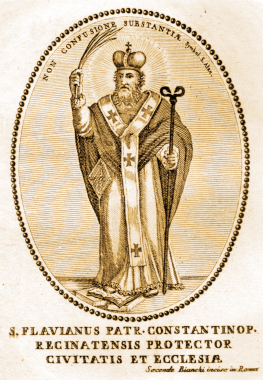Lives of the Saints
Our Models and Protectors
Spiritual Bouquet:
February 17

Saint Flavian
Patriarch of Constantinople,
Martyr
(† 449)
Flavian was elected Patriarch of Constantinople in 447. His short episcopate of two years was from its outset a time of conflict and persecution. The eunuch Chrysaphius, the emperor's favorite, tried to extort a large sum of money from Saint Flavian on the occasion of his consecration as archbishop. The Archbishop sent him some blessed bread as a sign of peace and communion, but his fidelity in refusing what might even have the appearance of simony, brought on him the enmity of the most powerful man in the empire, the same Chrysaphius.
In 448 Flavian had to condemn the rising heresy of the abbot Eutyches, who was a relative of Chrysaphius; the unfortunate abbot obstinately denied that Our Lord was in two perfect natures after His Incarnation. Eutyches drew to his cause all the bad elements which gathered about the Byzantine court. His intrigues were long baffled by the vigilance of Saint Flavian; but at last he obtained from the emperor the assembly of a council at Ephesus, in August 449, presided over by his friend Dioscorus, Patriarch of Alexandria. Its purpose was to depose Flavian and reverse the decision of the earlier council which had condemned Eutyches. Eutyches entered into this robber council, as it is called, surrounded by soldiers. The Roman legates could not even read aloud the Pope's letter, which clearly established Catholic doctrine and revealed the ignorance of Eutyches. At the first sign of resistance to the condemnation of the Catholic Patriarch Flavian, fresh troops entered with drawn swords. In spite of the protests of the legates, the soldiers terrified most of the bishops into acquiescence.
The fury of Dioscorus reached its height when Flavian appealed to the Holy See. The heretical bishop, who soon afterward would pretend to excommunicate the reigning Vicar of Christ, Saint Leo, forgot his apostolic office and laid violent hands on his adversary. Saint Flavian was seized by Dioscorus and others, thrown down, beaten, kicked, and finally carried into banishment at Epipa, near Sardes in Lydia, where he died shortly afterwards, in August of 449.
Let us contrast the ends of the faithful and the unfaithful servants. Saint Flavian clung to the teaching of the Roman Pontiff, and sealed his faith with his blood. Two years after his death, the Council of Chalcedon placed him among the choir of martyrs and Saints. Dioscorus, who excommunicated the Vicar of Christ, died obstinate and impenitent in the heresy of Eutyches. Chrysaphius was disgraced and sentenced to death by the emperor, whose eyes were eventually opened.
Les Petits Bollandistes: Vies des Saints, by Msgr. Paul Guérin (Bloud et Barral: Paris, 1882), Vol. 2; Little Pictorial Lives of the Saints, a compilation based on Butler's Lives of the Saints and other sources by John Gilmary Shea (Benziger Brothers: New York, 1894).